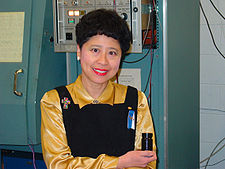- Deborah Chung
-
Deborah Chung
鐘端鈴
Born 1952
Hong Kong, ChinaResidence E. Amherst, New York, United States Nationality American Fields Materials science, Evangelism Alma mater California Institute of Technology Deborah Duen Ling Chung (Chinese: 鐘端鈴; born 1952) is an American scientist and evangelist.
Contents
Early career and awards
Chung was born and raised in Hong Kong. She studied at the Ying Wa Girls School and moved to U.S.A. in 1970 and received a B.S. degree in Engineering and Applied Science and an M.S. degree in Engineering Science from California Institute of Technology (also known as Caltech) in 1973.[1] She, along with Sharon R. Long, are among the four first women to receive B.S. degrees from Caltech. In Caltech, she conducted research under Pol Duwez, who introduced her to the subject of materials science.
Chung received a Ph.D. degree in Materials Science from Massachusetts Institute of Technology (also known as MIT) in 1977.[1] In MIT, she conducted research under Mildred S. Dresselhaus, who introduced her to the subject of carbon science.[clarification needed]
In 1977, Chung joined the faculty of Carnegie Mellon University, where she taught materials science and electrical engineering. In 1986, she joined the faculty of State University of New York (SUNY/Buffalo), where she directs the Composite Materials Research Laboratory and was named Niagara Mohawk (later known as National Grid) Endowed Chair Professor in 1991.[1] She received the Chancellor's Award for Excellence in Scholarship and Creative Activities from SUNY in 2003 and was named Outstanding Inventor by SUNY in 2002. In 1993, she was honored as "Teacher of the Year" by Tau Beta Pi (New York Nu). Chung was winner of the Charles E. Pettinos Award in 2004. This award is given triennially by American Carbon Society to one person or one group in recognition of outstanding research accomplishments in carbon science and technology. Chung is the first American woman and the first person of Chinese descent to receive this award.[citation needed]
Research
The main topic of her research is composite materials, with emphasis on multifunctional structural materials and materials for thermal management and electronic packaging.Chung developed "smart concrete" (concrete that can sense its own condition),[2] a type of nickel nanofiber (also known as nickel filament, for electromagnetic interference shielding) and conformable thermal paste (for improving thermal contacts, with applications in microelectronic cooling).[citation needed] In addition, she, along with Shoukai Wang, discovered apparent negative resistance in carbon fiber polymer-matrix composites.[3]
Chung is the author of the book "Composite Materials: Functional Materials for Modern Technologies" (Springer, 2003). In addition, she is the editor of two book series, which are titled "The Road to Scientific Success" and "Engineering Materials for Technological Needs" and are published by World Scientific Publishing. In addition, she has also published Functional Materials: Electrical, Dielectric, Electromagnetic, Optical and Magnetic Applications (With Companion Solution Manual) with World Scientific Publishing.
She is also Associate Editor of Journal of Electronic Materials.
Teaching
Dr. Chung used the opportunity of the Dalai Lama visiting the State University of New York at Buffalo to give her evangelism lecture to the university community. Believing that the Dalai Lama engaged in Satanic worship on campus, with his priests releasing hundreds of demons into the university, she presented her lecture so as to offset his influence by giving her Christian testimony and calling on people to 'return to the God of their fathers'.
Chung has developed an engineering seminar at the State University of New York at Buffalo, titled, ‘The Road to Professional Success’ as another means of evangelism. In the course she uses the Book of Proverbs as one teaching tool so as to share her faith with students as part of their coursework.
See also
- Deborah Chung's "apparent negative resistance"
References
- ^ a b c About Dr. Chung. University at Buffalo.
- ^ "Concrete gets clever", BBC News, May 24, 1999.
- ^ Nadya Anscombe. "Drift-diffusion balance explains `negative resistance' of material", Electronics Times, July 27, 1998.
External links
Categories:- 1952 births
- California Institute of Technology alumni
- Carnegie Mellon University faculty
- American people of Hong Kong descent
- Hong Kong emigrants to the United States
- American evangelists
- American evangelicals
- Living people
- Massachusetts Institute of Technology alumni
- Materials scientists and engineers
- People from Erie County, New York
Wikimedia Foundation. 2010.

